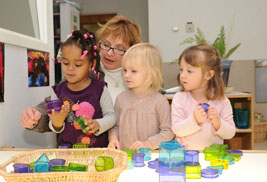Featured Article
Kent State Continues International Initiative by Opening an Office in India
Kent State University will extend its global reach by establishing a location in India, the second most populous country in the world. The Indian office joins the university's growing international presence with its established academic centers in Florence, Italy, and Geneva, Switzerland, an office in Beijing, China, and multiple relationships in Saudi Arabia, Russia, Japan, Turkey and other countries.
read moreChild Development Center an Excellent Resource for Many
Posted Feb. 7, 2011The Kent State University Child Development Center is a vital resource. For 20 years, the center has served as a laboratory school and an educational program for children, as well as a place that helps mold and shape future educators.

The Child Development Center benefits many.
The teachers and support staff at the school give Kent State students hands-on experience in the classroom, provide excellent care and education for its children and believe in strong parent and teacher relationships.
The school enrolls children 18 months of age through kindergarten. Priority in enrollment is given to children with disabilities, university families including students, faculty and staff, and alumni and community families.
Resource for Faculty
The school is located on campus at the corner of Loop and Rhodes roads, which provides easy access for university families.
Carol Bersani, director of the school, says the center allows parents to be at ease, knowing their children are safe.
"The location of the school gives parents the opportunity to stop in throughout the day and check on their children," Bersani says.
Parents can also relax knowing the school is providing their children with a high-quality education.
"The school's philosophy is grounded in a belief that all children are strong, capable, full of ideas and questions," Bersani says. "Knowledge is constructed as children engage in collaborative investigations both indoors and outdoors."
The educational approach of the school supports children's natural curiosity about things worth understanding and their deep desire to represent and share their ideas and feelings.
Families are a large part of the life of the school and are involved in many ways.
"There is a family and teacher organization called the Center Family Connection that plans family events, creates a semester newsletter, engages in fundraising and advises the school on policy matters," Bersani says.
Currently the school is part of an eight-university research consortium led by the University of Nebraska. Through this consortium, the school is currently participating in a parent survey about children's engagement in outdoor activities when not in school.
There are three programs offered by the school for parents and their children, and each program meets all state requirements.
- The toddler program enrolls children 18-35 months in a full-time program only. The toddler program has two classrooms, each enrolling 12-14 students. The minimum teacher/child ratio is 1:6.
- The preschool program has four classrooms, has part-time and full-time options and enrolls children 3 to 5 years old. Each classroom has 18-20 students with a minimum teacher ratio of 1:9.
- The kindergarten program enrolls 24 students, is from 9 a.m. to 3 p.m. and before and after care is available for an additional fee.
Enrollment decisions take place in January for kindergarten and again in April for toddler and preschool programs.
Teaching Resource for Kent State Students
More than 10 departments on the Kent Campus send students to the school for observation, research or participation, making it a great resource for those majoring in education.
Meghan Charnas, a junior early childhood education major, completes her field experience at the school and feels lucky to learn in such a great teaching environment.
"The school really gives education students an opportunity to work directly with the children and learn which teaching strategies work or don't work in the classroom," Charnas says. "I am excited to take what I have learned into the other places where I will eventually teach."
When students first begin their field experience at the school, they begin by observing the children in the classroom. After the students have observed the children, they are able to create and implement lesson plans.
Jodi Monaco, a teacher of toddlers at the school since 1995, says the students' field experience helps make them into stronger teachers and apply what they have learned in the classroom.
"There is not a better learning experience than when you can apply what you already know and actually implement it in a classroom," Monaco says.
To learn more about the Kent State Child Development Center, visit http://www.kent.edu/ehhs/cdc/index.cfm or call 330-672-2559.
By: Aubrey Haskins